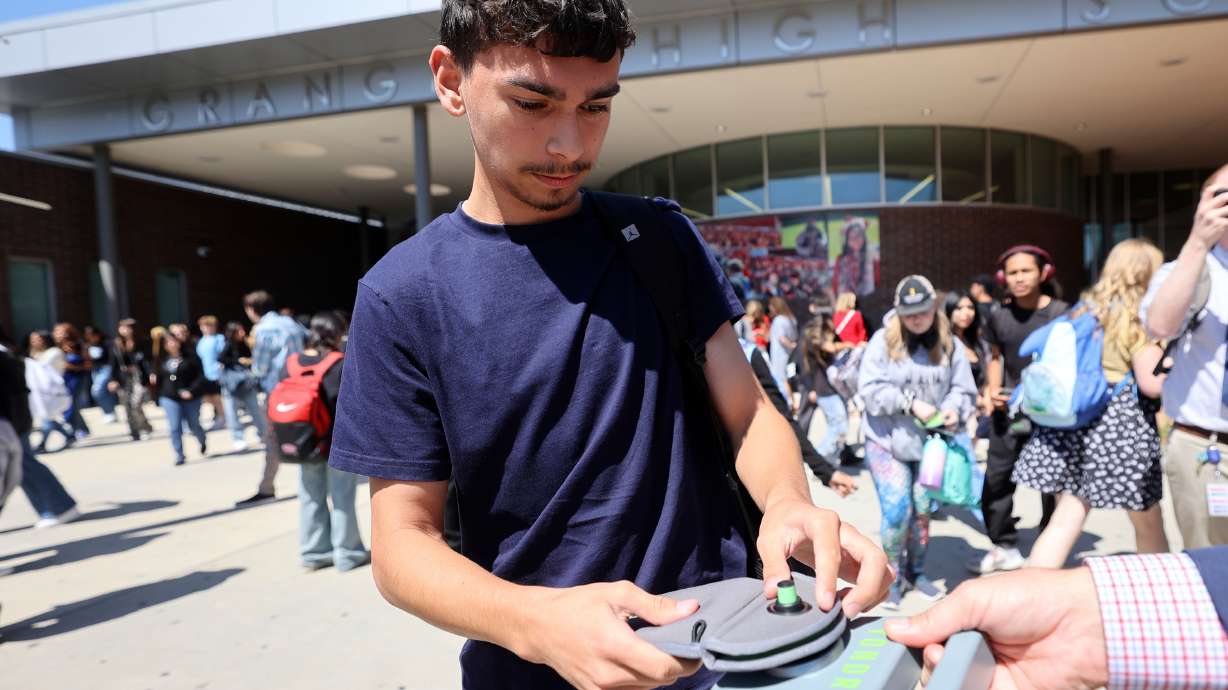Estimated read time: 5-6 minutes
This archived news story is available only for your personal, non-commercial use. Information in the story may be outdated or superseded by additional information. Reading or replaying the story in its archived form does not constitute a republication of the story.
WEST VALLEY CITY — Utah Gov. Spencer Cox sent letters in January to K-12 education leaders throughout the Beehive State sharing his concerns about the harmful effects social media has on children and asking them to remove cellphones during class time.
Now, these concerns and restrictions could culminate in new legislation introduced Monday by Sen. Lincoln Fillmore, R-South Jordan, and Rep. Douglas Welton, R-Payson, that aims to create a statewide stance making all Utah schools and classrooms cellphone-free, unless a district opts for a different policy.
"Currently, state law is silent on the issue of cellphones. Every school or school district adopts their own policy. This would change it so that the default position, instead of universal allowance for cellphones in schools, it would be a universal prohibition on cellphones in schools unless a school district adopted a specific policy to allow them because they find that it's good for some aspect of the educational process," said Fillmore, a former teacher.
The bill, which would be introduced during the 2025 legislative session, would preserve "local control" by allowing districts to create their own policies while also recognizing the impact that cellphones — especially smartphones — have on students and the learning process, Fillmore added.
The two lawmakers are joined in support of the bill by The Policy Project, a nonprofit that works with lawmakers to address societal issues through legislation.
"This smartphone bill is critical to the educational, emotional and social outcomes of our students," said Emily Bell McCormick, founder of The Policy Project. "This bill will flip the current law ... and make it so that each individual community has the ability to choose for themselves which is correct."
But school districts and individual schools in the state have already been doing this.

Ogden High School in February updated its cellphone policy to require every classroom to have a "secure cellphone locker" for students to store their phones during class. Ogden High joined a growing list of Utah schools in different districts banning cellphones, including Delta High School in Millard School District and Evergreen Junior High in Granite School District, among a plethora of others.
Additionally, the 2023 legislative session saw a similar bill that sought to ban both cellphones and smartwatches from K-12 public school classrooms; HB270, sponsored by Rep. Trevor Lee, R-Layton, was struck down by way of a 9-3 vote after hours of debate in the House Education Committee with Rep. Tyler Clancy, R-Provo; Rep. Angela Romero, D-Salt Lake City; and Rep. Carol Spackman Moss, D-Holladay, voting in favor of the bill.
McCormick said The Policy Project will work to ensure there's funding available to schools — in the ballpark of $3.5 million — to purchase the technology or physical equipment needed to implement cellphone-free schools.
The announcement for the new legislation was made at Granger High School in Granite School District, which this year implemented a new policy that has removed cellphones from district schools.

"I'm pleased to say that things are going swimmingly. By and large, we're seeing very little impacts to the classroom. Our kids get it. They understand," Superintendent Ben Horsley said. "Our teachers have benefited from the consistency of having a policy across the district, where it's not just hit-and-miss ... and different schools doing different things."
Granite's policy involves students locking their cellphones or smart devices in magnetic Yondr pouches at the beginning of the day, where they remain until the school bell rings at 2:10 p.m.
From there, the students have their pouches unlocked by a group of staff members waiting outside the doors as the students leave the building. The process takes around 15 minutes.
"We're on Day 9 of the school year, (and) we've seen major changes in our school," Granger High School Principal Tyler Howe said. "I've got teachers reporting to me that they have never fit so much stuff into the time that they have a class period. They're getting ahead of schedule because there's just not the same level of distraction."

Ryan Daim, a chemistry teacher at Granger High, said that so far, the policy has allowed students to be more engaged during their time in his classroom.
"Not only (engaged) with the material but being able to communicate with each other and talking and getting to know each other a little bit more. It's still early, but I am hopeful that those kind of things will continue, and we'll be able to see an improvement in student performance overall and school culture overall," Daim said.
He added that he's seen a "noticeable difference" from last year, both in his classroom and the school in general, when it comes to cellphone-induced distractions and students being more engaged in class material.
Despite the benefits educators are seeing without the presence of cellphones, the issue has raised concerns for some parents, who wonder how they can contact their students in the event of an emergency.
McCormick said that there's information "that's starting to show that in the case of an emergency, you want all eyes on teachers so that there's one person giving direction and not multiple sources of information because they're trying to call other people."
Fillmore emphasized that every district will be empowered to adopt its own cellphone policy in collaboration with parents, teachers and students, but he and other supporters of the legislation want the state's stance to be clear: There's no place for cellphones in Utah classrooms.









